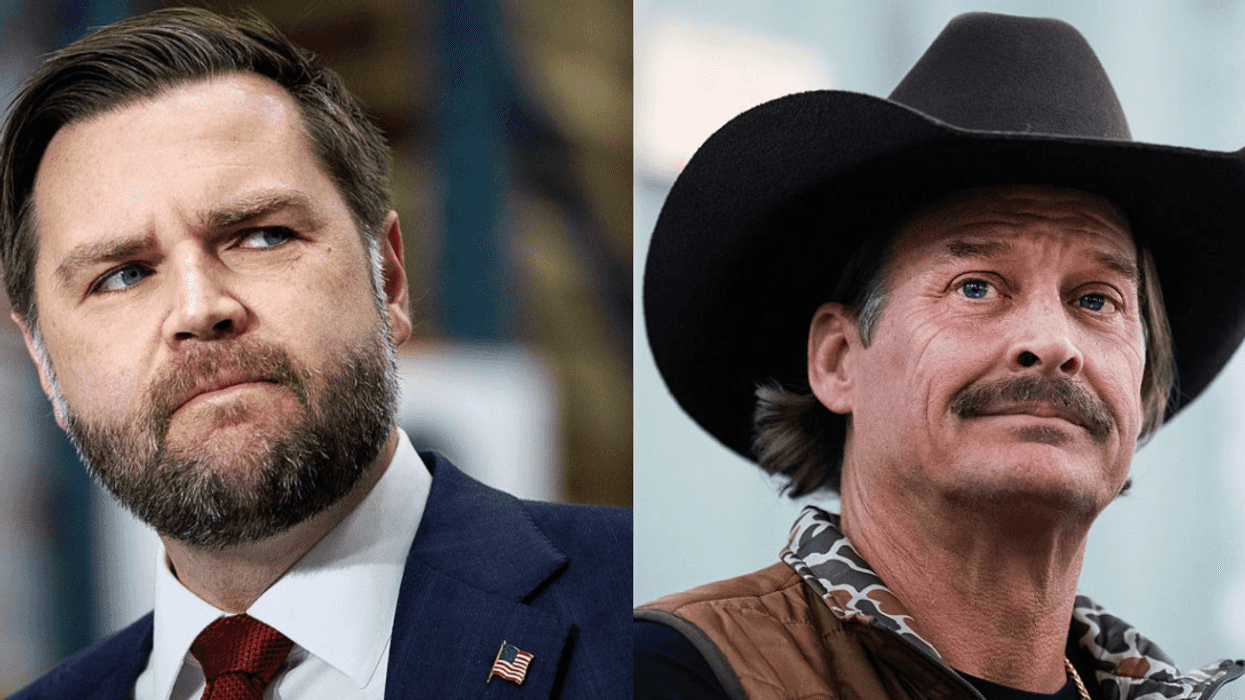Elisabeth Moss is star of Hulu's critically acclaimed series The Handmaid's Tale, but what many people don't know is that she also happens to be a scientologist.
Through the years, many critics have pointed out the seemingly obvious conflict between Moss's character on the show, who is fighting for equal rights, and her real-life association with an organization infamous for its abuse of members and past illegal practices.
However, in a new interview with the Daily Beast, Moss opened up about her religion and how she claims it actually works in tandem with her character from The Handmaid's Tale.
"Listen, it's a complicated thing because the things that I believe in, I can only speak to my personal experience and my personal beliefs. One of the things I believe in is freedom of speech. I believe we as humans should be able to critique things. I believe in freedom of the press. I believe in people being able to speak their own opinions."
Moss continued to speak about the importance of people having freedom of speech and religion:
"I don't ever want to take that away from anybody, because that actually is very important to me. At the same time, I should hope that people educate themselves for themselves and form their own opinion, as I have. The things that I believe in personally, for me, 'The Handmaid's Tale,' and the ability to do something that is artistically fulfilling but is also personally fulfilling, I've never had that. 'The Handmaid's Tale' lines up so perfectly parallel with my own beliefs in freedom of speech, freedom of religion, and the things that this country was actually built on."
The actress spoke about how a world in which people weren't allowed to practice a certain religion or say certain things would quickly become Gilead, The Handmaid Tale's sexist dystopia:
"I don't choose to talk about not just religion, but my personal life — who I'm dating and that kind of thing… I think people should be allowed to talk about what they want to talk about and believe what they want to believe and you can't take that away—and when you start to take that away, when you start to say 'you can't think that,' 'you can't believe that,' 'you can't say that,' then you get into trouble. Then you get into Gilead."
She ended her point by summing up her beliefs on freedom of religion:
"So whatever happens, I'm never going to take away your right to talk about something or believe something, and you can't take away mine."
Moss's defense of the first amendment is accurate, though it's not actually her right to be a scientologist that has come under fire in the past. Most critics take issue with Moss, who plays a character struggling against a tyrannically religious society, being actively complicit with a religion that has allegedly committed many similar transgressions, among them "espionage," "predatory financial practices," and "beating, imprisoning, and exploiting subordinates."
No one question's Moss's right to be a part of Scientology, but the hypocrisy of her choice catches many people's eye.
That having been said, Moss also distanced herself from some of Scientology's beliefs in the interview, such as their long history of anti-LGBTQ rhetoric:
"Which is not where I stand. It's like, it's a lot to get into and unpack that I can't do. But that is not my bag. I am obviously a huge feminist and huge supporter of the LGBTQ community and believe so strongly — I can't even tell you — in people being able to do what they want to do, to love who they want to love, to be the person that they want to be — whoever that is."
The Church of Scientology was founded in 1953 by science fiction writer Ron L. Hubbard in an effort to make money, as letters recovered by the FBI evidenced.
Though some countries, including the United States, treat Scientology as a legitimate religion, granting it tax-exempt status, many other countries, "including Belgium, Canada, Finland, France, Germany, Greece, Ireland, Israel, Mexico, Russia, the United Kingdom" refuse to recognize it as such, judging it to be "a commercial enterprise or a dangerous cult."
If the Church of Scientology is guilty of the things everyone who investigates it says it is, one can only hope Moss leaves it soon.








 Roberto Schmidt/AFP via Getty Images
Roberto Schmidt/AFP via Getty Images





 u/pizzaratsfriend/Reddit
u/pizzaratsfriend/Reddit u/Flat_Valuable650/Reddit
u/Flat_Valuable650/Reddit u/ReadyCauliflower8/Reddit
u/ReadyCauliflower8/Reddit u/RealBettyWhite69/Reddit
u/RealBettyWhite69/Reddit u/invisibleshadowalker/Reddit
u/invisibleshadowalker/Reddit u/Wishnik6502/Reddit
u/Wishnik6502/Reddit u/kateastrophic/Reddit
u/kateastrophic/Reddit u/blking/Reddit
u/blking/Reddit u/SlagQueen/Reddit
u/SlagQueen/Reddit u/geezeslice333/Reddit
u/geezeslice333/Reddit u/meertaoxo/Reddit
u/meertaoxo/Reddit u/crystal_clear24/Reddit
u/crystal_clear24/Reddit u/stinkpot_jamjar/Reddit
u/stinkpot_jamjar/Reddit
 u/Bulgingpants/Reddit
u/Bulgingpants/Reddit
 @hackedliving/TikTok
@hackedliving/TikTok @hackedliving/TikTok
@hackedliving/TikTok @hackedliving/TikTok
@hackedliving/TikTok @hackedliving/TikTok
@hackedliving/TikTok @hackedliving/TikTok
@hackedliving/TikTok @hackedliving/TikTok
@hackedliving/TikTok @hackedliving/TikTok
@hackedliving/TikTok @hackedliving/TikTok
@hackedliving/TikTok @hackedliving/TikTok
@hackedliving/TikTok @hackedliving/TikTok
@hackedliving/TikTok
 @vanderjames/Instagram
@vanderjames/Instagram @vanderjames/Instagram
@vanderjames/Instagram @vanderjames/Instagram
@vanderjames/Instagram @vanderjames/Instagram
@vanderjames/Instagram @vanderjames/Instagram
@vanderjames/Instagram @vanderjames/Instagram
@vanderjames/Instagram @vanderjames/Instagram
@vanderjames/Instagram @vanderjames/Instagram
@vanderjames/Instagram @vanderjames/Instagram
@vanderjames/Instagram @vanderjames/Instagram
@vanderjames/Instagram